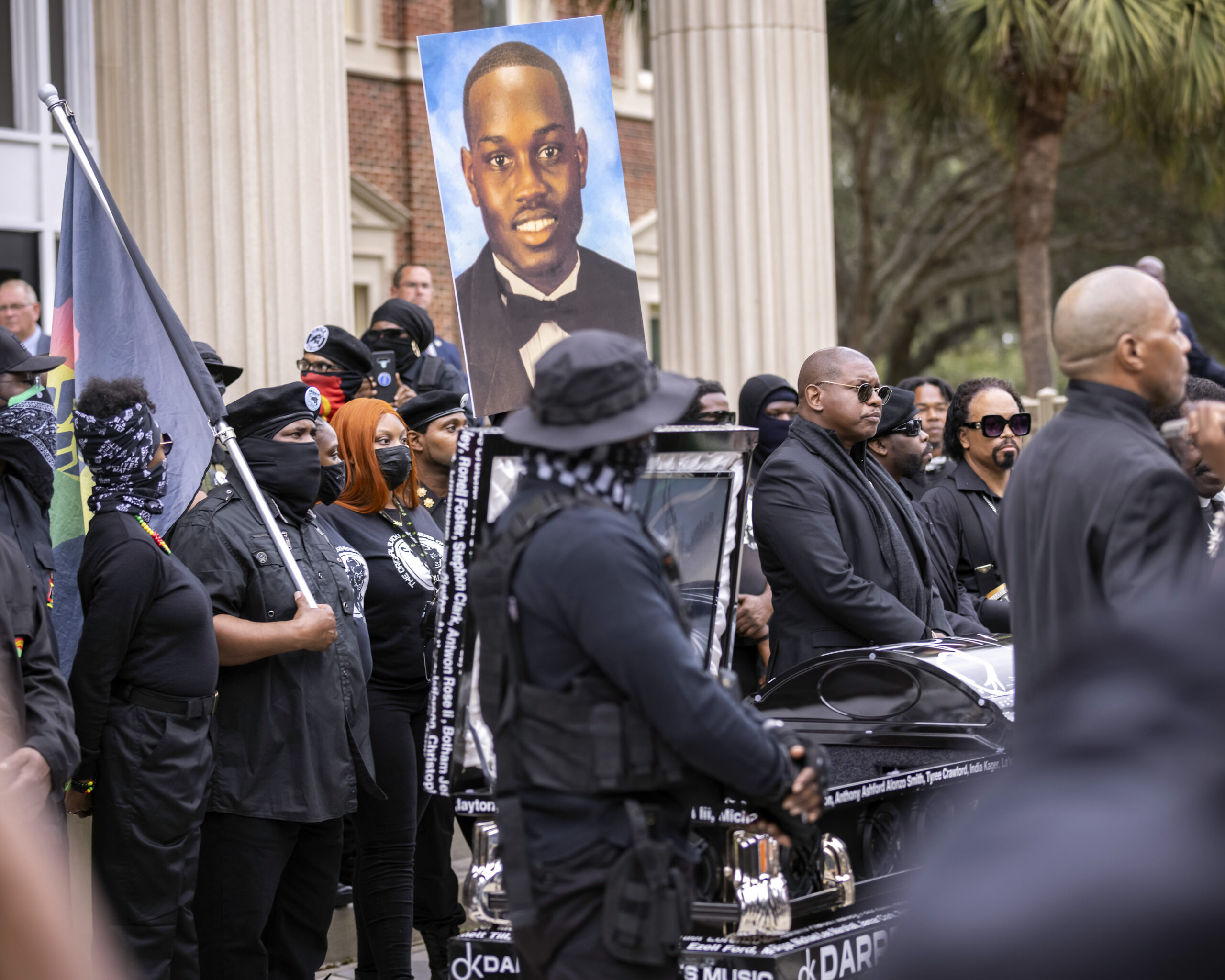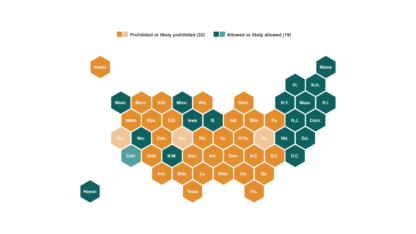Glynn County got its first Black police chief last year. Why did he just resign?

Dozens of Black Lives Matter and Black Panther protesters gather outside the Glynn County Courthouse where the trial of Travis McMichael, his father, Gregory McMichael, and William “Roddie” Bryan is held, Monday, Nov. 22, 2021, in Brunswick, Ga. (AP Photo/Stephen B. Morton)
In June 2021 Glynn County Police Chief Jacques Battiste took over a department racked with controversy and plagued by a yawning gap of trust with the community it was sworn to serve.
Eighteen months later, the county’s first-ever Black police chief has resigned, telling The Current he was tired of being “beaten up every day” both within his ranks and outside the department for trying to institute more accountability and reforms.
“(I was) tired of being beaten up every day, internally and externally, for what I’m trying to accomplish,” Battiste said, “Because it’s slow turning the ship when that ship is always on the same course.”
Battiste said he had officers internally who wanted a different type of police chief because “they were used to little accountability in the department … and they did not like what we were moving towards.”
Externally, he said there were community members and individuals on social media who would ding him for every mistake, who wanted someone else in charge or wanted the Glynn County Sheriff’s Office to consume the police department, according to Battiste.
Glynn County Manager Bill Fallon said Battiste did not have the command level management experience that they’ll be looking for in their next chief applicant.
“The commissioners supported him. I supported him,” Glynn County Manager Bill Fallon said. “The experiences somebody brings to a position, not having that command level management experience … not dealing with the public as much. He might not have been prepared for that.”
“It’s a difficult job being chief of police,” Fallon said. “He certainly was passionate. I think there’s a lot of forward motion (at the department).”
The county known worldwide as the place where Ahmaud Arbery was murdered by three white men while out for a jog in February 2020, has suffered from a flawed policing culture for more than a decade.
The 2010 shooting of Caroline Small by Glynn County Police showed a questionable use of force by officers and a botched internal investigation. The double-murder-suicide by a Glynn County officer in 2018 revealed numerous red flags of how senior officers ignored a spiraling officer’s behavior. Meanwhile, a special narcotics squad had to be disbanded after officers were indicted on corruption charges.
An investigation by The Current in 2021 revealed a pattern of racial bias within the force that had negatively affected trust among the county’s Black residents well before Arbery’s murder — an incident that Glynn police had originally written off as a justified killing before state investigators were brought in and secured arrests of the three white men responsible.
On Dec. 17, 2021, Glynn County swore in Battiste to serve as the agency’s 19th police chief and its first Black leader. The decision, after a rigorous selection process, came as county leaders struggled to respond to intense national criticism after Arbery’s murder.
Battiste knew of this deeply checkered history when he took the job.
His predecessor, John Powell, had been brought in to try to get the force’s lapsed accreditation back. His tenure ended, however, after a Glynn County grand jury indicted him and three other officers in 2020 on charges they turned a blind eye to misconduct in the department’s disbanded drug unit. Powell’s trial is set for January 28.
Battiste had 22 years of experience with the FBI and had worked as Deputy Constable/Training and Tactical Coordinator for a New Orleans police agency. His resume was thin, however, on community policing experience.
Still many in the community, especially Black leaders, took his hiring as a sign that a troubled department would be able to change. His supporters, including Glynn County Commissioner Allen Booker, were dismayed by Battiste’s resignation.
“This is a gut punch to me and others to lose Chief Battiste,” said Booker, the only Black commissioner. He credited the chief, even in his short tenure, for not flinching from changing the culture of policing.
Although Battiste was hired in the summer of 2021, he learned while onboarding that his Louisiana law enforcement certification wouldn’t transfer over to Georgia. He served as chief administratively, without any arrest powers, before joining a class of recruits at the Georgia Peace Officer Standards and Training Council (POST) to re-earn his certification in the fall. By December, he was sworn in officially.
Battiste told The Current that he was proud of several changes he had initiated in his short tenure, including:
- Establishing a training division for officers that went beyond state required standards and focused on community-specific issues
- Creating a behavioral health position for a specialist to accompany officers to mental health calls, rather than wait for the person to be arrested to receive a mental health check
- Structuring a ladder so officers have clear goals for what to do to earn a promotion, instead of promotions being based on a popularity contest with management
- Revamping discipline for officers and allowing more openness for complaints. One example included changing over the office where citizens and police officers file complaints from the police department to a local government building, so as to avoid intimidation
Battiste said he wanted it known the decision to leave was his alone. He has accepted a new job as executive director of a non-profit organization in Pennsylvania that works “in conjunction with the FBI,” he said, and aids in police department training. The organization, FBI-LEEDA, is not part of the FBI.
“I wasn’t pressured to resign. Nor was I asked to resign,” Battiste said. “I’m not running from anything.”
“It’s probably one of the hardest decisions I’ve made in my career. I’ve shed more tears about this job than I’ve shed about any job in my life,” Battiste said. “Because of the level of commitment I had for trying to help out.”
No decision has been made yet on an interim police chief. Battiste’s last day is Dec. 16.
NOTE: The Current clarified the relationship between Chief Battiste’s new position at FBI-LEEDA and the FBI. It is a nonprofit that provides training to law enforcement and works “in conjunction with the FBI,” but is not part of the FBI.
This story was provided by WABE content partner The Current.








